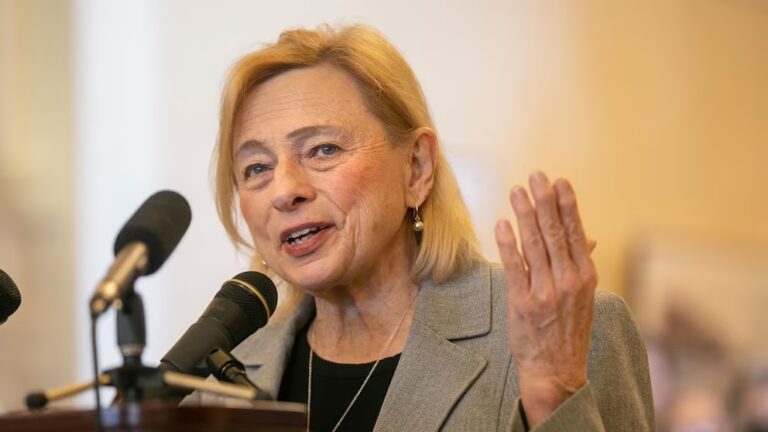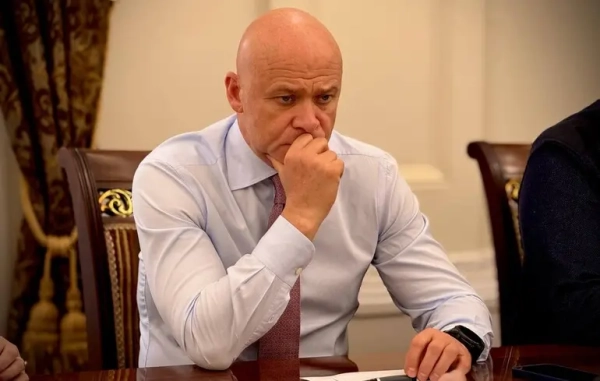The Senate race that it seems many people aren't watching could be the same one that helps Democrats maintain or even grow their slim majority in the chamber.
For years, North Carolina has been a battleground that both Democrats and Republicans have poured time and money into — but this year, not so much. Operatives and voters alike say the contest between Democrat Cheri Beasley, a former state chief justice, and Republican Rep. Ted Budd to succeed retiring Sen. Richard Burr has flown under the radar for most of the 2022 cycle while attracting comparatively less funding and attention from big-name surrogates.
Political experts chalk that up to several factors: The candidates' characteristics and backgrounds do not grab the zeitgeist compared to Senate hopefuls in other parts of the country, like John Fetterman in Pennsylvania or Blake Masters in Arizona; and money — which can guarantee eyeballs by paying for them — is being spent in North Carolina this year at lower levels than in the past.
'You have essentially normal candidates'?
Plenty of attention has and will be paid to Senate candidates in other battlegrounds — not just Arizona and Pennsylvania but also Ohio (where "Hillbilly Elegy" author and investor J.D. Vance is facing Rep. Tim Ryan) and Georgia (where Herschel Walker hopes to unseat Raphael Warnock while denying various personal controversies).
Beasley and Budd have not made those same kinds of headlines, partially by design.
She served as the chief justice of the North Carolina Supreme Court from 2019 to 2020 and was first appointed as an associate justice in 2012; he, a gun store owner, was first elected to the House in 2017.
"[It's not] just the media but people who follow politics want to focus on some of the more cartoonish characters who are running," said Doug Heye, a Republican strategist who has worked on three Senate races in North Carolina.
Heye rattled off who he meant with sardonic shorthand: "You know, the TV doctor [Mehmet Oz], the giant in the hoodie [Fetterman], the running back [Walker] and the guy who wrote the book [Vance]."
While Democrats would paint Budd, a member of the right-wing House Freedom Caucus, as deceptively more hardline than the state's past Republican senators — who worked across the aisle or broke with Donald Trump in major ways — others say he has effectively campaigned with few fireworks and embraced a different statewide style.
"Message discipline," is how Budd described it to Politico. But, he acknowledged, "people say this race in North Carolina is boring."
"You have essentially normal candidates," said Heye, the GOP strategist. "You have a member of Congress and a Supreme Court judge who's running for Senate, so you don't have something that necessarily catches the public eye in the way that those other races do, which means they're siphoning off a lot of attention."
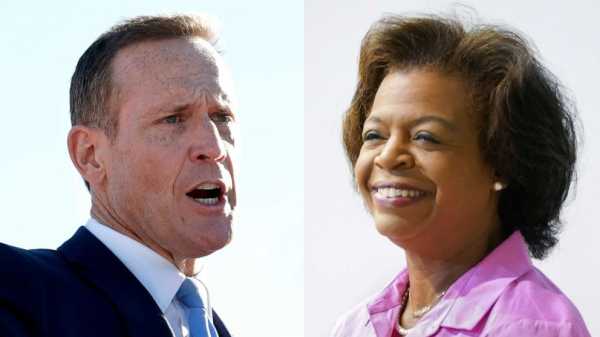
Combination photo of North Carolina candidates for the U.S. Senate, Republican, Ted Budd and Democrat, Cheri Beasley.AP Photo/Getty Images
North Carolina's purple hue hides a weird history
Many observers could assume North Carolina is becoming more reliably red, given how Republicans succeeded in federal races over the past few cycles — including three consecutive presidential races that all narrowly leaned right — after a blush of Democratic victory.
In 2008, Barack Obama won the state by the slimmest of margins. That same election cycle, Kay Hagan defeated incumbent Republican Sen. Elizabeth Dole. But President Obama lost the state during his successful reelection bid and Hagan was ousted after one term. No Democratic Senate candidate has won since.
Still, Democrats have a long history of winning some other statewide races.
Since the mid-1970s — in the more modern era of party politics, post realignments — North Carolina has had mostly Democratic governors, some of whom have served two consecutive terms. In the 2020 election, incumbent Roy Cooper won reelection and notably expanded his margin from 2016, even as Trump carried the state.
David McLennan, a professor of political science at Meredith College in Raleigh, described North Carolina's purple history as mixed this way: with a "red tinge" for federal elections and a "blue tinge" for state races.
Beasley is an example of this, winning two statewide judicial offices before losing her 2020 race for chief justice of the North Carolina Supreme Court by just 401 votes.
"We are a very strange state to a lot of people who don't live here, because it looks to some people [that] we're more Republican-leaning because of who we elect for federal offices; however, for state-level offices, it looks like we're more Democratic-leaning," McLennan told ABC News.
2022's Senate race doesn't draw as much outside involvement
Another reason North Carolina has not received as much relative attention this cycle is the lack of outside investment in the Senate race.
So far, the National Republican Senatorial Committee (NRSC) and the conservative Senate Leadership Fund (SLF) have contributed about $26.38 million combined toward backing Budd.
Democrats' Senate Majority PAC (SMP) has, meanwhile, poured in around $15 million for Beasley.
Officials with the Democratic Senatorial Campaign Committee (DSCC) would not disclose to ABC News how much money they have spent on Beasley, though the organization is funding staff at the North Carolina Democratic Party and funding voter registration programs as well as legal and voter protection programs. The DSCC also announced last year that North Carolina would be included in their Defend the Majority program: a $30 million commitment across nine Senate battlegrounds.
But those numbers pale in comparison to what was spent in 2020, when Democrat Cal Cunningham sought to unseat Republican Thom Tillis. Then, North Carolina was one of the most expensive elections of the year, with the NRSC and SLF funneling $61.7 million combined while the DSCC and SMP spent about $60.5 million.
And that's despite polling showing that, since July, Beasley and Budd have been separated by no more than 2%. (Cunningham also led in almost every poll in the final weeks of his race, according to FiveThirtyEight — then lost by 1.8% in the wake of a personal scandal.)
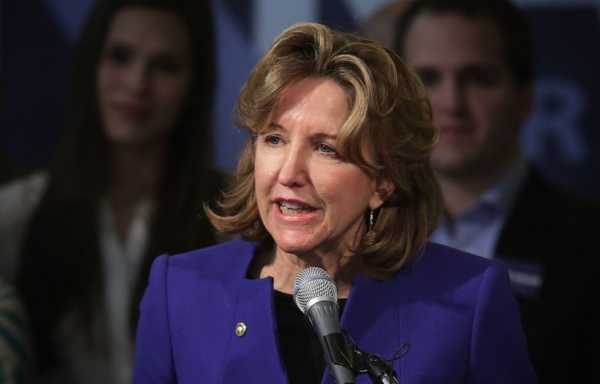
In this Nov. 4, 2014, file photo, incumbent U.S. Sen. Kay Hagan concedes as she speaks to supporters during her election night party in Greensboro, N.C.Alex Wong/Getty Images, FILE
As Nov. 8 nears, Beasley has run on protecting abortion access, after the overturning of Roe v. Wade, and on lowering health care costs while Budd has hit on the issue of supporting law enforcement and the economy — including high inflation.
ABC News reported earlier this year that some North Carolina Democrats had grown frustrated with the national party over what they said was insufficient support for Beasley, who appeared to be getting caught in a midterm map crunch.
Amanda Sherman-Baity, a spokesperson for the DSCC, told ABC News "that North Carolina is a Senate battleground" and the race remained "highly competitive."
Heye, the Republican strategist, said that both parties should be worried about the outcome.
"No one can take this race for granted," he said. "If you look at all the races that are getting the attention … none of them in the polling at this point — and again polling, of course, can be wrong — but the polling all shows that those races have a wider spread [than North Carolina]."
Echoing how voter surveys show some other swing-state Senate races — like Arizona — aren't nearly as neck-and-neck, McLennan, the professor, said that he didn't understand why either major political party isn't more financially invested.
"It's an odd thing for me to see that North Carolina is not one of the most expensive states in terms of campaign spending," McLennan said.
North Carolina has also lacked this cycle in some of the high-wattage allure of national figures stopping by to stump in the state. While Trump, President Joe Biden and Vice President Kamala Harris have all made appearances, other politicians have not — so far. This week, though, Donald Trump Jr. campaigned alongside Budd in Greensboro and Democratic Sens. Cory Booker and Jon Ossoff will hit the campaign trail with Beasley this weekend.
Some voters agree: We're being slept on
It's not just politicos in the state that feel North Carolina is flying under the radar; some plugged-in voters also feel the same.
Katherine Jeanes, who serves on the board of the Young Democrats of North Carolina, said that despite the high stakes in the Senate race, she thinks it's not getting as much media coverage or investment. She noted that Beasley, if elected, would be one of the few Black female senators in the country's history.
"Despite the incredible stakes, not just for the balance of the U.S. Senate but for electing women of color in the South, we're not getting media to focus down here," Jeanes told ABC News. "Cheri Beasley is a Democrat with a history of statewide electoral success like Raphael Warnock in Georgia and John Fetterman in Pennsylvania. But unlike them, she's not facing off against a controversial first-time celebrity candidate."
"Both parties are spending millions here, but … Republicans know what's at stake and they are putting their money where their mouths are," she said.
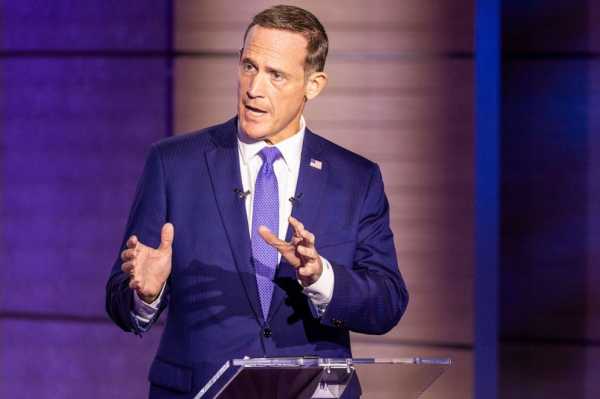
Republican candidate for U.S. Senate, U.S. Rep. Ted Budd, R-N.C., answers a question during a televised debate with Democratic challenger Cheri Beasley, on Oct. 7, 2022, at Spectrum News 1 studio in Raleigh, N.C.Travis Long/The News & Observer, Pool via AP, FILE
Robert Ganser, a Republican voter in Wilmington, told ABC News that he also feels like his state is getting short shrift.
"What comes to mind [is] North Carolina's national attention is quiet compared to the others," he said. "John Fetterman is getting more attention for his policies and crazy promises."
Ganser, who works with small businesses, said that Budd caught his eye because of his message on the economy.
"I review who is in office and their voting records and fact-checking. Ted Budd, running for the Senate, interests me and his policies to battle incredible federal government spending," he said.
And while Beasley has plenty of money — raising $7.42 million in the second quarter of 2022 — some of her potential Democratic colleagues don't want her to go unnoticed: Last month, Sen. Booker threw out the possibility that Sen. Brian Schatz of Hawaii and Connecticut Sen. Chris Murphy would shave their heads to raise money for her campaign.
Sourse: abcnews.go.com

